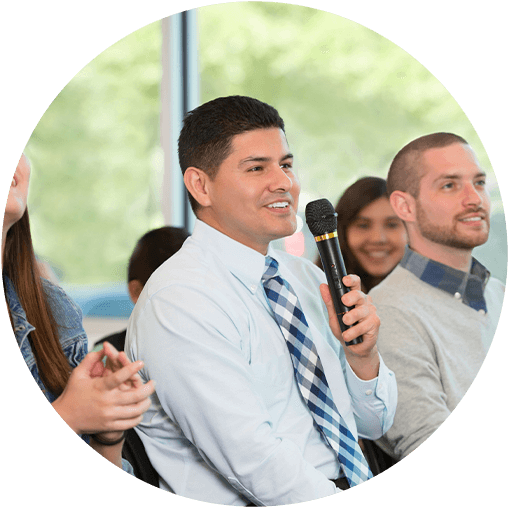Advocacy
What is Advocacy? Advocacy is sharing your story and educating elected officials and decision-makers about what’s happening in your community. Any person or organization can be an advocate for the social issues they care about most. When you raise your voice, you can help to shape the ways in which state and federal dollars are being used to make big-picture policy decisions in your area.
Advocacy isn’t lobbying or advertising, and anyone can speak up in support of an issue or cause to help define and direct the desired outcomes.
What is Health Equity?

Health equity is the ability for everyone to reach their full potential. Issues in our region surrounding equity and inclusion affect every layer of our community’s health. We know that advancing health equity in our state and throughout Southern Oregon requires removing substantial barriers to better health such as poverty, discrimination, poor work and living conditions, and limited access to education and housing.
Health equity is a big issue for Oregon. Throughout our state, there are organizations and agendas that are actively working to eliminate health gaps for underrepresented communities, and improve health outcomes for all Oregonians.
How HCCSO Advocates for Health Equity
At HCCSO, we advocate for all Southern Oregonians having access to opportunities that help them live their healthiest lives. We serve as the umbrella organization for a number of initiatives that impact health equity in our region. Currently, this includes convening Perinatal Task Forces in Douglas, Josephine and Jackson counties, as well as Healthy Start programs in Douglas and Josephine counties.
We’ve also managed several federal- and state-funded grants, including allocations from Rural Health Outreach, Health Insurance Outreach & Enrollment Assistance, and Oregon Health Authority Office of Equity and Inclusion.
We believe that advancing health equity involves embedding Diversity, Equity and Inclusion (DEI) work within our local organizations. By creating awareness and action at the leadership levels of Community Based Organizations, we can see a ripple effect of change.

How Healthy Start Advocates for Health Equity

Since 1996, HCCSO has been a recipient of the federal Healthy Start program that focuses on reducing infant and maternal mortality rates. Social disparities that have historically affected our rates in Southern Oregon include food insecurity, maternal smoking, poverty status and unemployment.
Visit The Numbers & The Story for more stats on our region.
As an affiliate of the National Healthy Start Initiative, we distribute and leverage federal dollars to reduce infant and maternal mortality rates in Southern Oregon. Without the support of our representatives in Washington D.C., this funding would cease. We work to ensure that our state representatives are consistently hearing the voices of those who support maternal and infant health. We work to amplify and share those voices, and encourage our policy-makers to continue taking action.
How You Can Take Action, Too
Let your unique voice be heard! Anyone has the power to reach out to elected officials, and to share their viewpoints and experiences regarding the issues they care about most. If you’re ready to make change in your community, we encourage you to raise your voice and take action on the policies you believe in.
Advocacy Toolkit

Step 1: Understand It
Research Your Issue
Talk with others in your community who are already taking action on the same issues you’re interested in. Learn about opportunities, obstacles, your community’s history with the matter, and the policy makers who you’ll be addressing with your message.
If you’re passionate about health equity in particular, below are great places to start with information regarding agendas and policies that are focused on Oregon children and families:

Step 2: Plan It
Decide whether you’ll move forward with an individualized effort, or if your message can be further amplified by joining or mobilizing a larger group. You can find and join existing events that focus on your issue, or create a new event with others in your community. Whether you plan a stand-in, a Day at the Capitol, or a virtual gathering, by planning ahead of time you can boost your efforts and create momentum for your cause.
You can also draft a letter to your local policy-makers. It’s not as challenging as you might think, and anyone can write to their representatives! Here are some tips for what to include:
- Your name and address
- The date
- An introduction to yourself and your personal story
- The reason you are writing (explain the issue)
- The outcome you’d like to see
- Ask for a response if you want one
- Your signature

Step 3: Do It
Take action and share your story. Choose where and how you’ll take the stage to best deliver your message. Here are some ideas:
- Attend a community or virtual town hall, school board meeting, or another open meeting to voice your support for the causes you believe in.
- Attend or give testimony to the Oregon Legislator (for a schedule of all Oregon Legislative activities, go to the Oregon Legislative Information System).
- Contact your elected officials and tell them how you and your community are being affected by programs in Oregon. Follow the links below with contact information for representatives in our area.
U.S. Senators
Representatives for Southern Oregon counties
- Jackson County: Pam Marsh
- Josephine County: Currently Unrepresented
- Douglas County: Christine Goodwin
To find representatives in other counties, follow this link and enter your zip code.
